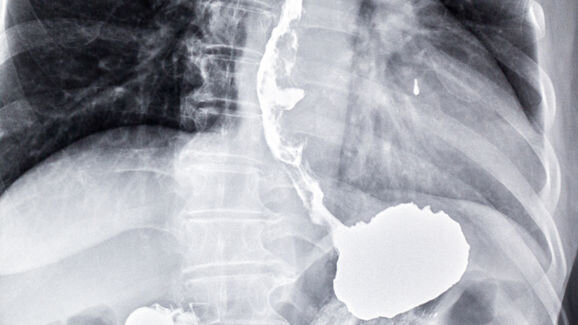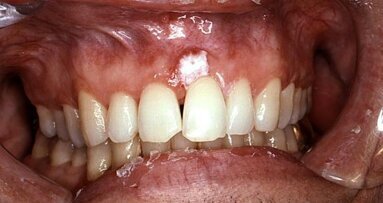LONDON, UK: An international team of researchers has developed a breath test that could help doctors diagnose the early signs of oesophageal and gastric cancer in minutes. The test has produced encouraging results in a clinical study and will now be tested in a larger trial involving three hospitals in London. According to the scientists, economic modelling showed that the new method could save the National Health Service (NHS) £145 million (approx. €205 million) a year, as it is cheaper, faster and easier to perform than other methods.
According to the researchers, oesophageal and gastric malignancies account for 15 per cent of cancer-related deaths globally. Both cancers are usually diagnosed in the advanced stages because they rarely cause any noticeable symptoms when they first develop. As a result, the long-term survival rate is 13 per cent for oesophageal cancer and 15 per cent for gastric cancer in the UK. Early diagnosis of these cancers could improve survival rates.
Doctors diagnose oesophageal and gastric cancers through endoscopies. However, the procedure is invasive and costs the NHS around £400–600 (approx. €560–850) per endoscopy. Only 2 per cent of patients who are referred for an endoscopy are diagnosed with oesophageal or gastric cancer.
“Oesophageal and gastric cancers are on the rise in the UK with more than 16,000 new cases diagnosed each year. The current method for detecting these cancers is expensive, invasive and a diagnosis is usually made at a late stage and often the cancer has spread to other parts of the body. This makes it harder to treat and results in poor long-term survival rates. Our breath test could address these problems because it can help diagnose patients with early non-specific symptoms as well as reduce the number of invasive endoscopies carried out on patients, which often lead to negative results. Diagnosis at an early stage could give patients more treatment options and ultimately save more lives,” said Prof. George Hanna, lead author of the study and Director of the National Institute for Health Research’s Diagnostic Evidence Co-operatives at Imperial College London.
The clinical study was led by scientists at Imperial College London and doctors at Imperial College Healthcare NHS Trust. Researchers from University College London, Keele University’s School of Medicine, J. Heyrovský Institute of Physical Chemistry and the Academy of Sciences of the Czech Republic in Prague were also involved in the study.
From 2011 to 2013, the researchers analysed breath samples from 210 patients with oesophageal and gastric cancer at Imperial College Healthcare NHS Trust using the new test. Both patients who were at risk of developing these cancers and those who had benign tumours were tested.
They found that the breath test can discriminate between malignant and benign oesophageal cancer in patients. It is 90 per cent accurate and provides results in minutes, compared with up to four to six hours using other methods. The test can also be applied to detect gastric cancer tumours.
Now, 400 patients at University College London Hospitals NHS Foundation Trust, The Royal Marsden NHS Foundation Trust, and Guy’s and St Thomas’ NHS Foundation Trust will take part in a further trial. The researchers hope to use the findings from the clinical trial to create a sensor device that could signal to doctors if a patient has a malignant tumour.
To take the test, patients breathe into a device similar to a breathalyser that is connected to a bag. The test looks for chemical compounds in exhaled breath that are unique to patients with oesophageal or gastric cancer. The cancers produce a distinctive smell of volatile organic compounds (VOC), chemicals that contain carbon and are found in all living things, and this could help doctors detect early signs of the disease.
The researchers were able to identify for the first time the number of VOCs in breath samples by using a selected-ion flow-tube mass spectrometer, an analytical instrument used to identify the chemicals present in a sample. This quantitative technology identified VOCs that were present at significantly higher concentrations in patients with oesophageal or gastric cancer than in non-cancerous patients. The researchers say that the results could be used to set a biomarker, a biological feature used to measure the presence or progress of a disease.
Similar breath tests to discriminate between benign and malignant tumours exist, but they have lengthy processing times and are unable to quantify the amounts of VOCs present in exhaled breath, according to the researchers.
The clinical study, titled “Mass spectrometric analysis of exhaled breath for the identification of volatile organic compound biomarkers in esophageal and gastric adenocarcinoma”, was published online in Annals of Surgery on 8 January.
LONDON, UK/AMSTERDAM, Netherlands: A test that measures the levels of five chemicals in the breath has shown promising results for the detection of cancers ...
LONDON, UK/ATLANTA, USA: Although the death rate from cancer in general has declined steadily over the past two decades, the latest statistics published by ...
LIVERPOOL – Owing to the absence of a uniform testing standard within the NHS, researchers have analysed a new test developed to classify ...
LONDON – Researchers from Queen Mary, University of London, have developed a new gene test that detects precancerous cells in patients with mouth ...
Breath odour is the presence of odorous volatile organic compounds in the breath of individuals. It is a widespread problem, as it affects a high percentage...
Breath odour is the presence of odorous volatile organic compounds in the breath of individuals. It is a widespread problem, as it affects a high percentage...
LONDON, UK: Seeking to improve oral cancer detection and treatment, researchers from Queen Mary University of London have developed the first polymerase ...
LEEDS, England: Improving oral healthcare for patients who have completed treatment for head and neck cancer remains a persistent challenge in the UK. Many ...
ABERDEEN, Scotland: Head and neck cancer is a highly debilitating disease that has profound consequences for oral function, nutrition, communication and ...
Engineers have developed a new device that can warn patients about early risks of tooth decay from diseases such as gingivitis and periodontitis.
Live webinar
Tue. 24 February 2026
6:00 pm UTC (London)
Prof. Dr. Markus B. Hürzeler
Live webinar
Tue. 24 February 2026
8:00 pm UTC (London)
Prof. Dr. Marcel A. Wainwright DDS, PhD
Live webinar
Wed. 25 February 2026
4:00 pm UTC (London)
Prof. Dr. Daniel Edelhoff
Live webinar
Wed. 25 February 2026
6:00 pm UTC (London)
Live webinar
Thu. 26 February 2026
1:00 am UTC (London)
Live webinar
Tue. 3 March 2026
4:00 pm UTC (London)
Dr. Omar Lugo Cirujano Maxilofacial
Live webinar
Wed. 4 March 2026
1:00 am UTC (London)
Dr. Vasiliki Maseli DDS, MS, EdM



 Austria / Österreich
Austria / Österreich
 Bosnia and Herzegovina / Босна и Херцеговина
Bosnia and Herzegovina / Босна и Херцеговина
 Bulgaria / България
Bulgaria / България
 Croatia / Hrvatska
Croatia / Hrvatska
 Czech Republic & Slovakia / Česká republika & Slovensko
Czech Republic & Slovakia / Česká republika & Slovensko
 France / France
France / France
 Germany / Deutschland
Germany / Deutschland
 Greece / ΕΛΛΑΔΑ
Greece / ΕΛΛΑΔΑ
 Hungary / Hungary
Hungary / Hungary
 Italy / Italia
Italy / Italia
 Netherlands / Nederland
Netherlands / Nederland
 Nordic / Nordic
Nordic / Nordic
 Poland / Polska
Poland / Polska
 Portugal / Portugal
Portugal / Portugal
 Romania & Moldova / România & Moldova
Romania & Moldova / România & Moldova
 Slovenia / Slovenija
Slovenia / Slovenija
 Serbia & Montenegro / Србија и Црна Гора
Serbia & Montenegro / Србија и Црна Гора
 Spain / España
Spain / España
 Switzerland / Schweiz
Switzerland / Schweiz
 Turkey / Türkiye
Turkey / Türkiye
 UK & Ireland / UK & Ireland
UK & Ireland / UK & Ireland
 International / International
International / International
 Brazil / Brasil
Brazil / Brasil
 Canada / Canada
Canada / Canada
 Latin America / Latinoamérica
Latin America / Latinoamérica
 USA / USA
USA / USA
 China / 中国
China / 中国
 India / भारत गणराज्य
India / भारत गणराज्य
 Pakistan / Pākistān
Pakistan / Pākistān
 Vietnam / Việt Nam
Vietnam / Việt Nam
 ASEAN / ASEAN
ASEAN / ASEAN
 Israel / מְדִינַת יִשְׂרָאֵל
Israel / מְדִינַת יִשְׂרָאֵל
 Algeria, Morocco & Tunisia / الجزائر والمغرب وتونس
Algeria, Morocco & Tunisia / الجزائر والمغرب وتونس
 Middle East / Middle East
Middle East / Middle East

















































To post a reply please login or register